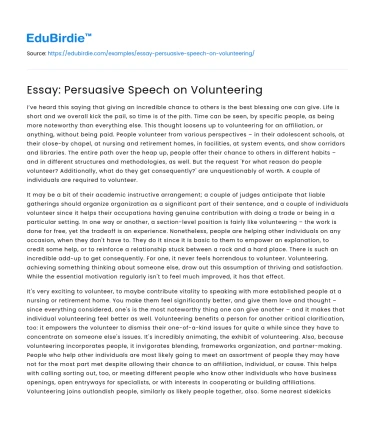Introduction
Volunteering is a powerful means of fostering community engagement and personal growth. This civic activity not only aids communities but also enriches the lives of volunteers themselves. In today's fast-paced world, the act of volunteering transcends mere charity; it embodies a profound commitment to societal welfare and individual empowerment. It serves as a cornerstone for cultivating empathy and solidarity among diverse populations. This essay endeavors to elucidate the multifaceted benefits of volunteering, advocate for its widespread adoption, and address counterarguments that question its efficacy and necessity. By delving into real-life examples and credible sources, this discourse will reveal how volunteering is indispensable in creating cohesive societies and enhancing personal well-being.
The Societal Benefits of Volunteering
Volunteering plays a pivotal role in enhancing societal structures by addressing various community needs. According to a report by the Corporation for National and Community Service, volunteers contributed an estimated 8.8 billion hours of service in 2016, equating to roughly $184 billion in economic value (CNCS, 2018). These figures underscore the tangible economic impact of volunteer work, which assists in areas such as education, health, and disaster relief. Educational initiatives, for instance, benefit significantly from volunteers who mentor students, thereby improving academic outcomes and reducing dropout rates. In healthcare, volunteers support overburdened systems by providing companionship to patients and aiding in logistical tasks, thereby enhancing service delivery.
Save your time!
We can take care of your essay
- Proper editing and formatting
- Free revision, title page, and bibliography
- Flexible prices and money-back guarantee
Moreover, volunteering promotes social cohesion by bridging cultural and socio-economic divides. It fosters a sense of belonging and community spirit, as individuals from diverse backgrounds unite towards common goals. This unity is evident in disaster response initiatives, where volunteers from various regions collaborate to provide relief and rebuild affected communities. The sense of solidarity and shared purpose nurtured through such endeavors strengthens societal bonds and fosters resilience against future adversities.
Personal Growth and Development Through Volunteering
On an individual level, volunteering catalyzes personal growth and development. It offers a unique platform for acquiring new skills and gaining valuable experiences that are often unattainable in traditional educational settings. According to a study by the University of Exeter, individuals who engage in volunteering report increased levels of life satisfaction and mental well-being (Jenkinson et al., 2013). This boost in mental health is attributed to the sense of purpose and fulfillment derived from helping others, which, in turn, enhances self-esteem and reduces stress.
Furthermore, volunteering cultivates essential life skills such as leadership, communication, and problem-solving. These competencies are increasingly sought after in the modern workforce, making volunteering an invaluable asset for career advancement. Real-life examples abound of individuals who, through volunteer work, have discovered new career paths or refined their professional skills. For instance, many healthcare professionals attribute their decision to pursue medicine to their early volunteer experiences in hospitals or clinics.
Addressing Counterarguments
Despite the numerous benefits, some skeptics argue that volunteering can be inefficient or even counterproductive. Critics contend that volunteers may lack the necessary expertise, leading to suboptimal outcomes. However, this argument overlooks the fact that many volunteer organizations provide extensive training and support to their volunteers, ensuring that they are well-equipped to handle the tasks at hand. Moreover, volunteer efforts are often supplementary to professional services, rather than replacements, thereby enhancing rather than detracting from the overall impact.
Another counterargument is that volunteering may perpetuate dependency within communities, preventing them from becoming self-sufficient. While this concern is valid, it is essential to recognize that effective volunteer programs focus on empowerment rather than dependency. For example, many international volunteer organizations prioritize capacity-building initiatives that equip local communities with the skills and resources needed to sustain themselves in the long term.
Conclusion
In conclusion, volunteering emerges as a vital component of societal progress and personal fulfillment. It offers significant economic, social, and individual benefits that are indispensable in today's interconnected world. While counterarguments exist, they are largely surmountable with proper training and a focus on empowerment. Through volunteering, individuals gain invaluable skills and experiences, communities receive much-needed support and cohesion, and society as a whole benefits from a more engaged and empathetic citizenry. As we continue to navigate complex global challenges, fostering a culture of volunteerism will be essential in building resilient and compassionate societies.






 Stuck on your essay?
Stuck on your essay?

